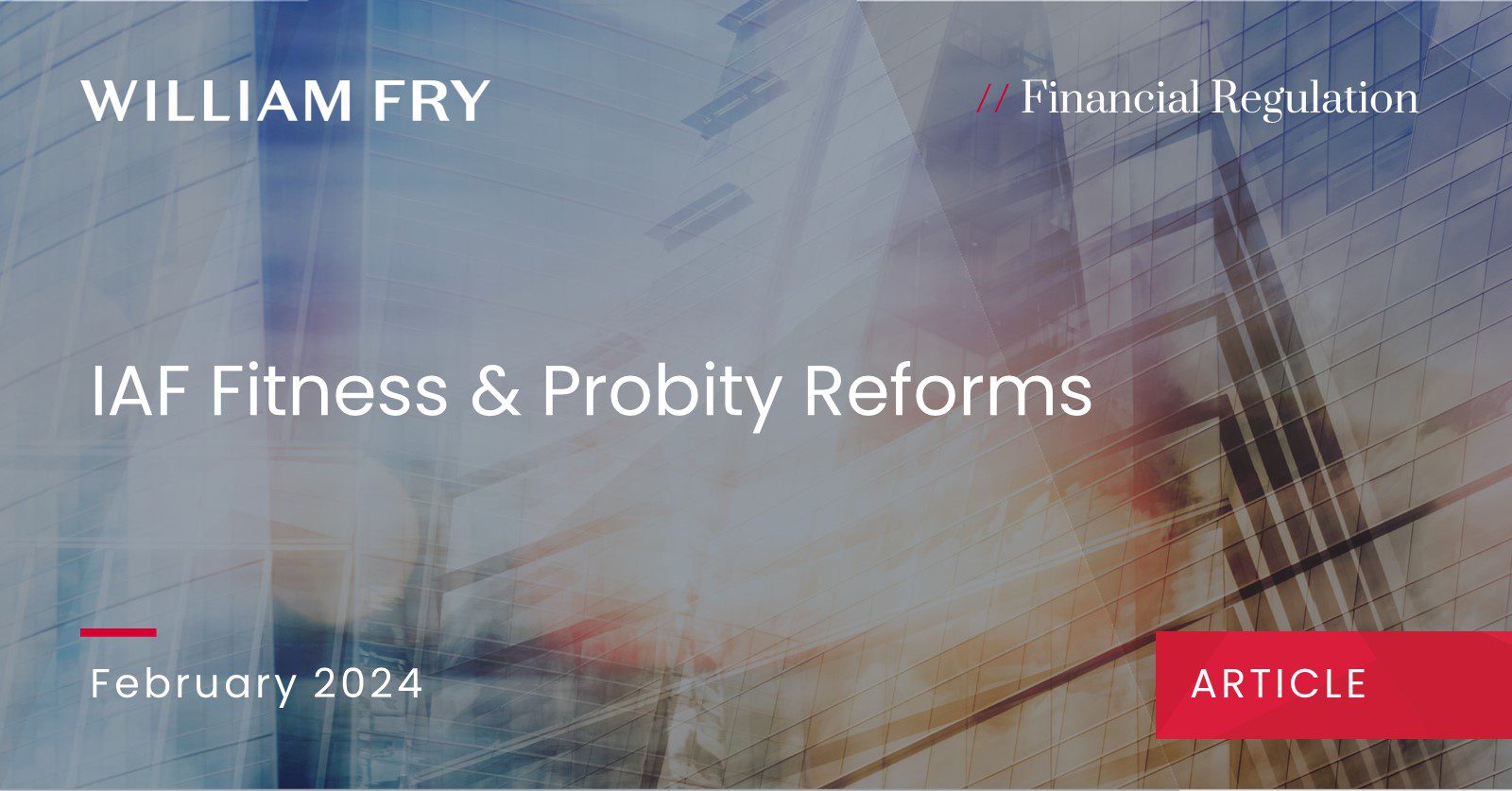The Central Bank Individual Accountability Framework (IAF), which (except for the Senior Executive Accountability Regime (SEAR)) came into effect on 29 December 2023, has reformed the Central Bank Fitness and Probity (F&P) regime.
Except for the SEAR regulations, which are not yet signed, the IAF regulations and related documents have been published on a piecemeal basis between December 2023 and January 2024. Our Financial Regulation team provide an overview of the new IAF regulations and Central Bank documentation below.
Quick Guide
| Short name | Reference | Effective date / Updated | Link |
|---|---|---|---|
| PCF Regulations | Central Bank Reform Act 2010 (Sections 20 and 22) (Amendment) Regulations 2023 (S.I. No. 663 of 2023) | 29 December 2023 | PCF Regulations |
| Holding Company Regulations | Central Bank Reform Act 2010 (Sections 20 and 22 - Holding Company) Regulations 2023 (S.I. No. 664 of 2023) | 29 December 2023 | Holding Company Regulations |
| Certification Regulations | Central Bank Reform Act 2010 (Section 21(6)) Regulations 2024 (S.I. No. 2 of 2024) | 8 January 2024 | Certification Regulations |
| F&P Standards | Central Bank Fitness and Probity Standards | December 2023 | FandP Standards |
| F&P Guidance | Central Bank Guidance on Fitness and Probity Standards | December 2023 | FandP Guidance |
| F&P In-Situ Submission Guidance | Central Bank | January 2024 | In-Situ Submission Guidance |
| PCF Confirmation Guidance | Central Bank PCF Annual Confirmation Guidance | January 2024 | PCF Confirmation Guidance |
| PCF List | List of Pre-Approval Controlled Functions | December 2023 | PCF List |
| CF List | List of Controlled Functions | December 2023 | CF List |
Fitness and Probity Regime
The F&P regime was introduced by the Central Bank under the Central Bank Reform Act 2010 (2010 Act) to protect the public interest and to ensure public trust and confidence in the financial system.
A key function of the regime is to ensure that individuals in key and customer-facing positions (known as Controlled Functions (CFs) and Pre-Approval Controlled Functions (PCFs)) within a regulated financial service provider (regulated firm) are competent, capable, honest, ethical, of integrity and are financially sound.
PCF Regulations
The PCF Regulations were signed on 20 December 2023, effective 29 December 2023. These Regulations amend the Central Bank Reform Act 2010 (Sections 20 and 22) Regulations 2011 and provide for the following changes:
Materiality threshold introduced for Branch Managers
Amended PCF-16 to Branch Manager of a branch established outside the State but only where the business arising from the branch amounts to 5% or more of, as applicable, the assets or revenues or gross written premium of the regulated financial service provider; and
New PCF roles
Introduced new PCF roles:
- PCF-54 Head of Material Business Lines for Insurance Undertakings;
- PCF-55 Head of Material Business Lines for Investment Firms; and
- PCF-53 Head of Client Asset Oversight for Credit Institutions.
Holding Company Regulations
Section 9 of the Central Bank (Individual Accountability Framework) Act 2023 (IAF Act) amends Section 20 of the 2010 Act to extend the F&P regime to holding companies established in Ireland and to provide the Central Bank with a regulation-making power to prescribe CFs and PCFs of these holding companies. The Holding Company Regulations were signed on 20 December 2023, effective 29 December 2023. The Holding Company Regulations extend the F&P regime for the first time to holding companies established in Ireland and allow the Central Bank to prescribe CFs and PCFs in relation to these holding companies. The Holding Company Regulations prescribe new PCF roles to the Chairperson (HCPCF-1) and a Director (HCPCF-2) of a holding company and CF roles to the holding company equivalent of CF-1 (HCCF-1) and CF-2 (HCCF-2) roles in a regulated firm.
Certification Regulations
The Certification Regulations were signed and became effective on 8 January 2024. The Certification Regulations set out the F&P certification requirements for regulated firms and holding companies.
The Certification Regulations apply to all regulated firms and holding companies to which Part 3 of 2010 Act applies.
Key changes in relation to the new certification requirements are:
Certification obligation extended to CFs under the IAF regime
The IAF Act amended and replaced section 21 of the 2010 Act to provide that a regulated firm must not permit a person to perform a CF in relation to it unless a certificate of compliance with standards of fitness and probity, given by the regulated firm in accordance with section 21, is in force in relation to the person.
Under IAF Act, the Central Bank can make regulations prescribing the form and content of the certificate, the period of validity of the certificate and the adoption of related procedures, systems and checks by the regulated firm.
Certification submission
- Compliance certificate to be issued before appointment – A regulated firm or holding company must issue the certificate of compliance referred to above in respect of each CF performed by the person before such person is appointed to the CF role.
- Compliance certificate requirements – Such firm must state its satisfaction that the person complied with any F&P standard in the certificate of compliance.
- New entrant to the F&P regime – Where any entity becomes a regulated firm or holding company and the above conditions are met, the firm (within five days) must issue a certificate of compliance in respect of each CF.
- Person performing multiple CF roles – Where an individual performs multiple CFs, these should each be addressed in the F&P certificate for that individual and updated accordingly.
- Period of validity – Certificates of compliance will be valid for 12 months from the date of issue.
Record keeping
- Regulated firms and holding companies must maintain a record of:
- the CF performed by each person;
- aspects of the affairs of the firm in which such person will be involved;
- the basis for the firm’s satisfaction that such CF meets the F&P Standards; and
- any outsourcing arrangement where the outsourcing arrangement involves the performance of a CF and the outsourced service provider is a person who is not a regulated firm or a certified person within the meaning of section 55 of the Investment Intermediaries Act 1995.
- All information and documentation relied on to issue a certificate of compliance must be kept for a minimum of six years after that person has ceased to perform a CF role in the firm.
Filing
- The initial confirmation of compliance with the Certification Regulations must be filed by 1 January 2025 (in respect of the 2024 calendar year). In scope regulated firms and holding companies must file confirmation of compliance on an annual basis after this date and notify the Central Bank of a revocation or non-renewal decision about a certificate of compliance.
Central Bank F&P Standards and Guidance
In December 2023, the Central Bank published revised F&P Standards and related Guidance to take account of changes to the F&P regime introduced by the IAF.
F&P Standards
The revised F&P Standards now include holding companies and also amend Section 4 (conduct to be honest, ethical and requirement to act with integrity) to include queries on the following:
- a person’s suspension in a role;
- being prosecuted for (not just convicted of) an AML/CTF offence;
- proceedings being issued (not just a civil finding) in relation to fraud, misrepresentation, dishonesty or breach of trust;
- provision of untruthful, false or misleading information to regulatory authorities (not just to the Central Bank);
- being subject to remuneration clawbacks as a result of alleged wrongdoing;
- being subject to disciplinary proceedings by an employer/regulated financial service provider/holding company;
- being convicted of a criminal offence or subject to criminal investigations and proceedings or the subject of criminal proceedings or civil proceedings;
- being subject to pending criminal proceedings or managing an organisation subject to pending criminal proceedings.
These amendments to Section 4 are also reflected in the revised F&P Individual Questionnaire which was introduced in mid-2023.
F&P Guidance
Key changes to the F&P Guidance include the addition of a new Part C regarding CFs, the CF certification process and due diligence requirements. The Guidance provides further information on the Central Bank’s expectations and requirements concerning:
- the certification process;
- the identification of CFs;
- forming a view that a person is fit and proper;
- required frequency of completing the certification process in respect of all CFs;
- confirmation of agreement to comply with the F&P Standards;
- the submission of data for certification to the Central Bank;
- the retention of data concerning certification; and
- due diligence underlying the certification process.
On 17 January 2024, the Central Bank updated its F&P In-Situ Submission Guidance. This document guides regulated firms and holding companies on submitting PCF in-situ information through the Central Bank’s Portal.
How we can help
William Fry is assisting regulated firms with their implementation of the IAF regime and our IAF/SEAR team is available to help.
Please visit our dedicated Individual Accountability & SEAR web page for our analysis and commentary to date.
Contact Us
For more information, please contact Shane Kelleher, Louise Harrison, Hilary Rogers or any member of the Financial Regulation unit or your usual William Fry contact.
Contributed by Jane Balfe




